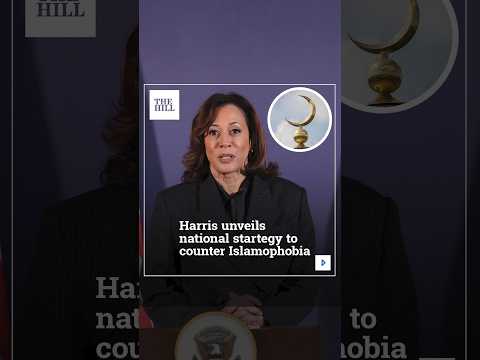The recent announcement of the national strategy to counter Islamophobia represents a crucial milestone in the fight against anti-Muslim sentiment across the United States. With rising cases of discrimination and hate crimes fueled by entrenched stereotypes, this strategy emerges not merely as a political move but as a necessary moral obligation. It’s essential to emphasize that fostering an inclusive society, where respect and understanding thrive, is not just good policy; it’s the right thing to do.
This comprehensive strategy targets various aspects of society—from education to community engagement—aiming to dismantle misconceptions that plague the Muslim community. As history has shown, present-day Islamophobia is rooted in medieval prejudices that date back to the Crusades, where harmful narratives about Islam were amplified by the Christian Church. Understanding that backdrop is crucial to addressing the issues at hand, and the national strategy to counter Islamophobia does just that. Let’s break down the pillars that support this critical initiative.

The Top 5 Pillars of the National Strategy to Counter Islamophobia

1. Education and Awareness Programs
One of the most significant components of the national strategy to counter Islamophobia is the focus on education and awareness programs. Comprehensive curricula are being developed with organizations like the Council on American-Islamic Relations (CAIR) to equip schools with necessary tools that debunk myths surrounding Islam. K-12 education is a crucial battleground, shaping perceptions among impressionable minds. When students understand the diversity of Islamic teachings and cultural practices, they’re less likely to harbor unfounded fears or biases.
Schools aren’t alone in this effort; public seminars and workshops aim to broaden understanding among adults as well. This proactive approach is essential since misinformation often arises from a lack of knowledge. Community members attending these programs can take their newfound insights back home, creating a ripple effect of awareness that sweeps through neighborhoods, just like how a small pebble can create ripples in a pond.
2. Community Engagement Initiatives
Creating authentic community connections is vital to combating Islamophobia. The strategy incorporates funding for local governments to organize community dialogues and interfaith events reminiscent of the West Chester Interfaith Coalition in Pennsylvania. These gatherings allow individuals from different faiths and backgrounds to meet face-to-face, listen to one another’s experiences, and foster empathy.
When communities bridge divides, they not only reduce suspicion but also cultivate genuine friendships. By participating in these local initiatives, individuals from various backgrounds can grasp opposite perspectives and work collaboratively to build a united front against hate. Whether it’s sharing a meal or participating in a discussion, these moments of connection can dismantle barriers that division fosters.
3. Legislative Advocacy and Policy Change
Political action plays a crucial role in realizing the goals set out in the national strategy to counter Islamophobia. Legislative advocacy efforts, driven by representatives like Ilhan Omar and Rashida Tlaib, focus on enacting laws that protect Muslim communities from hate crimes and discrimination. Their tireless work brings attention to pressing issues, urging lawmakers to enact policies that hold assailants accountable.
Policies aligned with the national strategy shouldn’t just be reactive but proactive. They should create a culture that challenges bigotry at every level, from the classroom to the boardroom. When legislation recognizes the dignity of every individual, it affirms the belief that diversity enriches society rather than threatens it.
4. Online Hate Speech Regulation
In our digital age, the proliferation of hate speech on social media has become alarmingly prevalent. Recognizing this, the strategy advocates for stricter regulations on online platforms, urging tech giants like Facebook and Twitter to enhance their monitoring systems. Initiatives launched by the Anti-Defamation League (ADL) are valuable in developing guidelines that identify and eliminate harmful content effectively.
A safer digital environment is vital for fostering healthy discussions about Islam and its followers. Increased accountability can deter individuals from spreading hateful rhetoric online. Simply put, when tech companies take responsibility, they can significantly reduce the volume of toxic narratives circulating on their platforms.
5. Support for Victims of Islamophobia
An essential part of the national strategy to counter Islamophobia is the support offered to victims who have faced discrimination or violence. Organizations like the Muslim Legal Fund of America provide legal resources and counseling for those affected, but the national strategy aims to strengthen these initiatives further. This multi-faceted approach ensures that victims receive not just justice but also the mental and emotional support they need to heal.
An inclusive society is one that stands ready to support those unjustly affected by hate. Emotional well-being is just as critical as legal protections; victims deserve more than a quick fix. Building systems that support those impacted reinforces the idea that hate will never prevail in a society united against it.

The Role of Collaborative Actions in Combating Islamophobia
If we’re serious about the national strategy to counter Islamophobia, collaborative actions are where the magic happens. Programs like the “Building Bridges” initiative in Virginia exemplify how joint efforts between government agencies, non-profits, and community organizations can yield significant change. By pooling resources and expertise, these partnerships create a holistic approach to combating Islamophobia, ensuring that multiple viewpoints inform policy-making.
Moreover, initiatives led by the U.S. Department of Justice signal a commitment to engage civil society organizations in addressing systemic issues. When communities have a seat at the table, their unique voices and experiences enrich policy discussions and generate more effective solutions to the challenges they face. In Baltimore, similar collaborations highlight this importance as local leaders strive to build an environment of mutual respect and understanding.

Innovative Strategies for the Future
Looking ahead, the national strategy to counter Islamophobia sets the stage for long-lasting solutions. One exciting avenue could be enhancing media literacy programs that empower individuals to analyze and critique the content they encounter. In this information-driven world, knowing how to discern fact from fiction is imperative for all, especially regarding sensitive topics like religion and identity.
Tech companies also have a role to play. Encouraging them to implement algorithms that promote inclusive narratives can transform how the public perceives Islam and its followers. By amplifying positive stories and contributions from Muslim communities, we can reshape public sentiment in a meaningful way.
Storytelling can be a powerful tool. Platforms that highlight personal narratives from individuals within Muslim communities humanize experiences often overlooked. Every story shared brings more understanding and compassion into discussions, emphasizing that we are all part of the same narrative.
In conclusion, the national strategy to counter Islamophobia marks a pivotal step toward creating an inclusive society. However, its success is a collective endeavor requiring vigilance, empathy, and ongoing action from all sectors of society. By emphasizing education, fostering connections, and advocating for victims, we can dream of a future where Islamophobia is an antiquated notion, replaced by unity and respect for all. Now’s the time to stand together shoulder to shoulder—not just in Baltimore but all across the country—to make that vision a reality.

National Strategy to Counter Islamophobia: Fostering Understanding and Respect
Highlighting the Initiative
As the national strategy to counter Islamophobia rolls out, its main focus is on dismantling the toxic myths that falsely portray Muslim communities. Shockingly, a recent survey highlighted that over 60% of Americans admit they know little about Islam. This ignorance fuels hate and misinformation, making this strategy not just necessary but urgent. While we bask in the weather in Baltimore, it’s crucial to recognize how misinformation can impact communities here and around the world.
Tributes and Representation
One of the strategy’s goals is to improve representation and support for Muslim voices in media and public discourse. Celebrating diversity not only enriches our society but promotes understanding. Just like how the loss of Newark firefighters recently prompted heartfelt tributes, making sure all communities are recognized fosters a sense of belonging. This can counter the negative narratives surrounding Islam and reflect the real narratives of hope and resilience. Interestingly, did you know that representation in entertainment can shape societal views? For example, remember the humor and camaraderie in shows like North Dallas Forty? Such narratives can similarly pave the way for better understanding across cultures.
Building Connections
Ultimately, the national strategy to counter Islamophobia isn’t just about spreading facts; it’s about building connections. Community engagement plays a pivotal role in changing hearts and minds, much like the bond formed between contestants on the reality show Survivor Cagayan. Both scenarios highlight how shared experiences can bridge divides. In the same vein, improving understanding around the complexities of Islam can combat fear and suspicion. A supportive environment, one that offers resources akin to mortgage advice for first-time buyers—like today’s mortgage rate in California—can empower communities to navigate misinformation and open paths to dialogue and reconciliation.
With each step toward understanding, it becomes clearer that just like the girl in the anime The Girl I Like Forgot Her Glasses, who navigates her world with innocence, we too may need to see beyond our biases and embrace a clearer vision of connection. The national strategy to counter Islamophobia is our collective effort to foster peace and solidarity for all.

What is being done to combat Islamophobia?
Many governments are tackling Islamophobia by putting anti-hate crime laws in place and creating initiatives to prevent and punish hate crimes. They’re also running public campaigns aimed at educating people about Muslims and Islam, so folks can shake off the negative stereotypes and myths.
Which country has the most Islamophobia?
While it can be tough to measure, some reports suggest that countries in Europe, particularly France and Germany, have higher levels of reported Islamophobia. Factors like social tensions, immigration, and politics play a big role in these sentiments.
What are the roots of Islamophobia?
The roots of present-day Islamophobia trace back to anti-Islamic and anti-Muslim views that were pushed by the Christian Church during the Medieval times, especially around the time of the Crusades when stereotypes and negative attitudes began to take shape.
Who is the special representative against Islamophobia?
The special representative against Islamophobia at the United Nations is appointed to promote understanding and address issues related to Islamophobia globally, working towards combating discrimination and supporting affected communities.
What is the cause of Islamophobia?
Islamophobia often springs from fear, misunderstanding, and misinformation about Muslims and their beliefs, which can be fueled by negative media portrayals and political rhetoric.
Which country has no Muslims?
Countries such as the Vatican City, which is predominantly Roman Catholic, have no Muslim population, as they adhere strictly to their religious identity without significant diversity.
Which country is safe from Islam?
No country can claim to be completely “safe” from Islam, as Islam is a major world religion with over a billion followers. However, some nations have stricter immigration and religious policies that limit the presence of Islam.
Which country banned the hijab?
France has seen a controversial ban on the hijab in certain public spaces, notably in schools, which has sparked much debate about religious freedom and societal integration.
Did Islam grow out of Christianity?
Islam did not grow out of Christianity, but rather shares some historical roots and figures. It emerged in the 7th century as a distinct faith with its own beliefs and practices.
What religion predates Islam?
Judaism is generally considered to predate Islam, as it has roots going back thousands of years before the advent of Islam in the 7th century.
Is Islam a variant of Christianity?
Islam is not a variant of Christianity; it is a separate religion with its own beliefs, practices, and religious texts, even though they share some common figures and principles.
What is Canada doing about Islamophobia?
Canada is making strides to combat Islamophobia through government initiatives that promote inclusiveness and safety, along with implementing educational programs to combat stereotypes and promote understanding among communities.
How should we treat non Muslims?
Everyone, regardless of their faith, deserves to be treated with respect and kindness. We should strive to engage in open dialogue and embrace the diversity that makes our communities rich.
What are examples of Islamophobia?
Examples of Islamophobia include hate speech, discrimination, physical violence against Muslim individuals, and vandalism of mosques or Islamic centers, all of which show a lack of understanding and respect.
What is the Islamic ruling on jihad?
In Islam, jihad is often misunderstood; it refers to the struggle to live a good life according to Islamic principles, with the greater jihad being the internal struggle for self-improvement, while lesser jihad can refer to defending the faith when necessary.



























